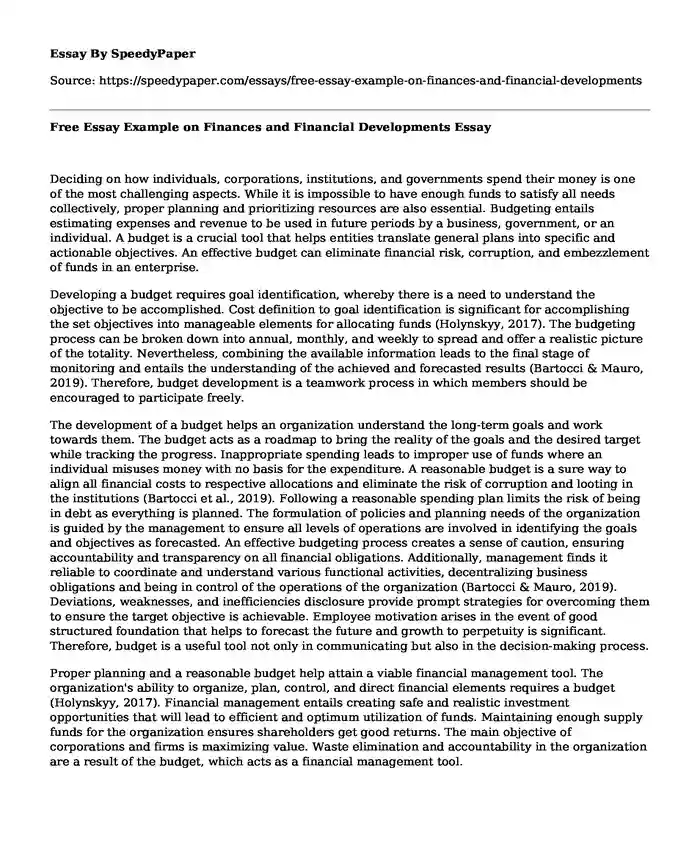
| Type of paper: | Essay |
| Categories: | Finance Budgeting Financial management |
| Pages: | 3 |
| Wordcount: | 629 words |
Deciding on how individuals, corporations, institutions, and governments spend their money is one of the most challenging aspects. While it is impossible to have enough funds to satisfy all needs collectively, proper planning and prioritizing resources are also essential. Budgeting entails estimating expenses and revenue to be used in future periods by a business, government, or an individual. A budget is a crucial tool that helps entities translate general plans into specific and actionable objectives. An effective budget can eliminate financial risk, corruption, and embezzlement of funds in an enterprise.
Developing a budget requires goal identification, whereby there is a need to understand the objective to be accomplished. Cost definition to goal identification is significant for accomplishing the set objectives into manageable elements for allocating funds (Holynskyy, 2017). The budgeting process can be broken down into annual, monthly, and weekly to spread and offer a realistic picture of the totality. Nevertheless, combining the available information leads to the final stage of monitoring and entails the understanding of the achieved and forecasted results (Bartocci & Mauro, 2019). Therefore, budget development is a teamwork process in which members should be encouraged to participate freely.
The development of a budget helps an organization understand the long-term goals and work towards them. The budget acts as a roadmap to bring the reality of the goals and the desired target while tracking the progress. Inappropriate spending leads to improper use of funds where an individual misuses money with no basis for the expenditure. A reasonable budget is a sure way to align all financial costs to respective allocations and eliminate the risk of corruption and looting in the institutions (Bartocci et al., 2019). Following a reasonable spending plan limits the risk of being in debt as everything is planned. The formulation of policies and planning needs of the organization is guided by the management to ensure all levels of operations are involved in identifying the goals and objectives as forecasted. An effective budgeting process creates a sense of caution, ensuring accountability and transparency on all financial obligations. Additionally, management finds it reliable to coordinate and understand various functional activities, decentralizing business obligations and being in control of the operations of the organization (Bartocci & Mauro, 2019). Deviations, weaknesses, and inefficiencies disclosure provide prompt strategies for overcoming them to ensure the target objective is achievable. Employee motivation arises in the event of good structured foundation that helps to forecast the future and growth to perpetuity is significant. Therefore, budget is a useful tool not only in communicating but also in the decision-making process.
Proper planning and a reasonable budget help attain a viable financial management tool. The organization's ability to organize, plan, control, and direct financial elements requires a budget (Holynskyy, 2017). Financial management entails creating safe and realistic investment opportunities that will lead to efficient and optimum utilization of funds. Maintaining enough supply funds for the organization ensures shareholders get good returns. The main objective of corporations and firms is maximizing value. Waste elimination and accountability in the organization are a result of the budget, which acts as a financial management tool.
Conclusion
Overall, a budget remains a crucial tool for the daily operations of various entities. It requires all stakeholders in the business to work together, ensuring proper planning and prioritizing of funds to realize development and growth in different sectors. Organizations that participate in effective budgeting processes have control and enjoy progression without constraints. Therefore, it is everyone's responsibility to understand the significance of having a budget in their organization.
References
Bartocci, L., Grossi, G., & Mauro, S. G. (2019). Towards a hybrid logic of participatory budgeting. International Journal of Public Sector Management, 32(1) 65-79.
Holynskyy, Y. (2017). The importance of financial management principles in the State budget execution. Annals of Spiru Haret University. Economic Series, 17(4), 19-28.
Cite this page
Free Essay Example on Finances and Financial Developments. (2023, Dec 19). Retrieved from https://speedypaper.net/essays/free-essay-example-on-finances-and-financial-developments
Request Removal
If you are the original author of this essay and no longer wish to have it published on the SpeedyPaper website, please click below to request its removal:
- Essay Example on Bank Interest Rates
- Identification and Discussion of Major Dilemmas. Paper Example
- Essay Sample on Weis Markets and Chicago Rivet-Valuation
- Essay Sample on Risks and Decision Making
- Free Essay: Using Conflict in A Positive Way
- Paper Example. Market System Overview
- Critical Analysis of How Organisation can Facilitate and Manage Innovation - Free Essay Sample
Popular categories




